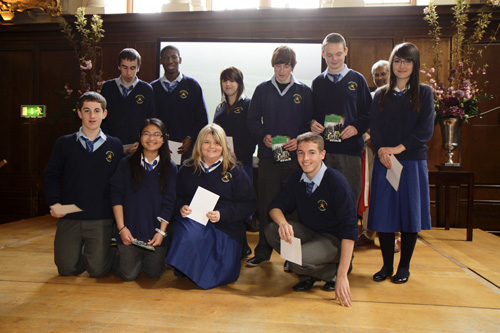Secondary School Students Complete TCD Technology Programme, ‘Bridge2College’
Posted on: 13 May 2010
Three hundred transition year students from 15 Dublin secondary schools recently (May 4th) completed the Bridge2College programme, a pioneering technology programme that aims to explore the potential of technology to mediate a dynamic, creative, cross-curricular values-based learning experience for second level students . The event, which celebrates the achievements of the students who participated on the programme, also included a technology awards ceremony which recognises outstanding effort and achievement during the year.
The Bridge2College (B2C) programme was designed to provide students from designated disadvantaged second-level schools with an innovative learning experience using technology and is a joint initiative between Suas Educational Development, Trinity College’s Access Programme (TAP) and the Centre for Research in IT in Education (CRITE) at Trinity College. Students on the programme are mentored by volunteer undergraduate and postgraduate TCD students who combine a very specific model of teamwork with the creative use of technology to provide an innovative educational model for 21st century learning. Since the programme’s inception in 2007 more than 1,500 students from 30 schools have taken part in the project which is designed to complement school initiatives whilst also inspiring confidence, creativity, individuality and a desire for learning.

Students of De La Salle secondary school after receiving their certificates for completing the Bridge2College programme.
On the occasion of the graduation ceremony, key industry stakeholders in ICT and lead figures from the education sector gathered for a panel discussion facilitated by Dr Patrick Geoghegan, lecturer in TCD Department of History, chaired by David Went, Chairman of the Trinity Foundation, and attended by Minister Eamon Ryan. The discussion, which focussed on the theme of Bridging from the Victorian Classroom to the 21st Century Learning, highlighted the role of the B2C programme, which is poised for deployment in second level schools, in support of a dynamic new initiative to radically change learning and teaching practices for Junior Cycle.
Commenting at the graduation, Brendan Tangney of TCD’s Centre for Research in IT in Education said: “There has been considerable public debate in the past few months around the need for our education system to change its emphasis away from a perceived culture of ‘learning to the exam’ towards one in which high order skills such as analysis, synthesis, communication, collaboration and creativity are nurtured and truly valued. Furthermore in a time of unprecedented national crisis it behoves key institutions, policy makers and social leaders to think creatively about how our collective problems can be addressed. The educational model developed in the Bridge2College programme arises out of such an innovative alliance of different groups within TCD, ranging from education through Computer Science to the University Access Programmes, and an Educational NGO. Working closely with our partner schools we feel we have developed an educational model which can be adapted for use in our secondary schools to address the key concerns alluded to above. We are keen to engage with schools to roll this model out in the coming year.”
Colman Farrell, CEO Suas Educational Development added: “Suas is proud to be associated with the young people from the Bridge2College programme and are delighted to be part of the exciting new initiative for education in Ireland, as the B2C moves to deployment in our partner schools. The achievements of the students celebrated today highlights that given the right support, they have the potential to become leaders in our society. If we are to succeed as a nation, we must give all of our students the opportunity to realise their potential – socially, culturally and economically. We believe that the educational approach taken in the B2C could help us meet that challenge. Focusing on teamwork, personal leadership and values based learning we are developing the supportive and creative environment that allows students to thrive.”
About TAP:
The Trinity Access Programmes are a key part of Trinity’s social mission and their central goal is to make Trinity’s student body more inclusive and diverse and to reach out to the wider community. The B2C is one of a number of programmes involving primary and secondary school students. These programmes focus on working in partnership, through a network of School Liaison Officers, with 20 primary and 20 secondary schools in the Dublin area, designated disadvantaged by the Department of Education & Science.
About CRITE:
The Centre for Research in IT and Education (CRITE) at Trinity College is a multi-disciplinary research centre whose focus is on creating and evaluating innovative learning experiences, inspired by educational principles and technical progress. Students and researchers from CRITE provide technically-mediated learning tools and material for the B2C programme, built on the findings of current research. These learning activities are based on a constructionist approach to learning, with the students supported in developing their own interests and experiencing creative uses of technology.
About Suas Educational Development:
Suas Educational Development is a movement dedicated to supporting quality education in targeted under-resourced communities with programmes in Ireland, India and Kenya. In 2008, Suas improved the education of over 20,000 children from under resourced and marginalised communities through peer-to-peer mentoring and extracurricular learning initiatives, by improving resources and facilities, supporting teachers and building the management and learning capacity of our partners. The Bridge2College is Suas’ flagship programme in Ireland, offering an innovative learning experience for young people from under resourced schools in the Dublin area.
